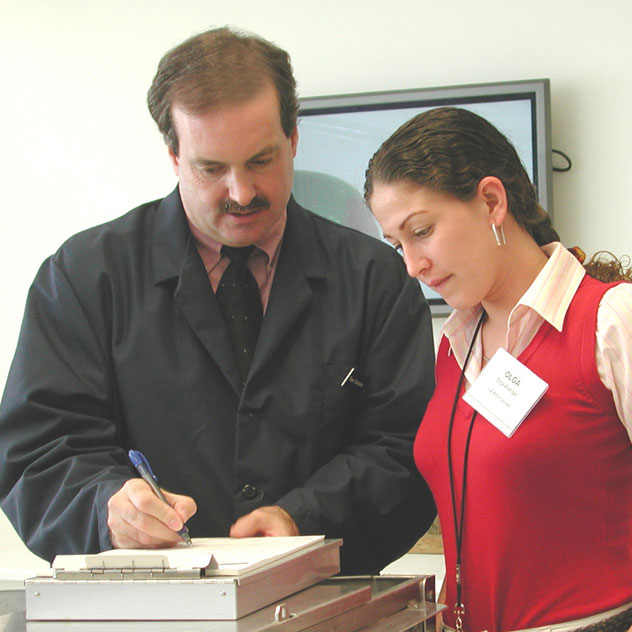
- What is the cost of a training class?Due to the many options available for your training needs (the length of the training class and the curriculum content), please contact IPT for specific pricing plans available to you, for your specific training needs.
- What are the days and hours available for the training classes?The classes can be held any day of the week, any time of day. The days and times are flexible for your convenience.
- What type of training will I receive?The courses are usually designed to include a time period for lecture, questions and answers. In addition time is set aside for hands on inspecting and demonstration. The course will be designed to your requests and specifications.
- What is the difference between this class and the class taught by the USDA?The USDA Classes are held at the Training and Development Center in Fredericksburg, VA on a limited basis, only three or four times per year. The USDA Classes charge a per person tuition fee. You have limited input on choices of commodities for the training class. The classes may include hours of training on commodities that are of little or no interest to your company. The USDA Classes devote time to the USDA procedures for completing their notesheets, their certificates and their procedures.International Produce Training offers much more affordable training classes tailored to the specific needs of your company, at your warehouse, packing facility or distribution center; saving on travel costs, lodging and per diem of your employees….not to mention the convenience of the training being held in your facility, for your employees only. Because the classes are designed specifically for your staff, they receive the same training from the same trainer, providing uniformity to your inspection procedures. You choose the products that you would like to be included in your training class.
- After the training class will I be a certified USDA Inspector?No, you will not be certified as a USDA Inspector. Only federal or federally licensed state employees may be certified as a USDA Inspector.
- What are considered typical expenses?Typical expenses are travel and lodging expenses incurred for the training class. Actual lodging costs are considered. Expenses may include rental vehicle, tolls, and air fare.

- We receive produce based on our own company specifications. Will this training class be worthwhile?Yes, if you desire, your company’s specifications can be included with each lesson.
- I usually learn by doing. Will I be able to see actual specimens?Aside from some time devoted to a lecture format, time is recommended for actual “hands on” inspecting. It is suggested that product be made available for demonstrations, as a learning exercise. Sampling methods, cutting procedures and looking for and identifying defects is emphasized during this format.
- What type of commodities can the training class include?As far as what types of commodities can be included with the training…..the sky’s the limit. You can choose from Apples to Zucchini. If you would like to establish a formal training program, you could have one class devoted to citrus, another devoted to stone fruit, and another devoted to vegetables.
- How many different types of commodities are included?The number of commodities for each training class varies on your approach. For beginners, or new inspectors, it is recommended to limit the commodities to no more than 6 commodities per day. If you are looking for a “Refresher Training”, more commodities may be built into the training class, with time devoted to questions and answers and a discussion format.
- How many people may attend a class?For optimal training results, it is recommended that the class size be limited to no more than 12 attendees. If you choose to utilize the lecture format only, then class size is unlimited. The same class and agenda may be used at different distribution centers or facilities to ensure uniformity among all employees, within your organization.
- I have only 1 or 2 people needing the training; will this benefit me?Absolutely. IPT will design a job embedded/hands-on training course, providing one on one training during your actual receiving and inspection process. Exercises and demonstrations are built in to the training session to ensure the participants are learning and retaining the skills necessary for their job duties.
- Who decides on what is taught?A Course Designer from International Produce Training will discuss with you your needs and expected goals of the training class. The ultimate decision is yours, to structure the course any way you desire.
- What are the advantages to hosting a training class?If you are interested in hosting a training class, for other industry members, we would be glad to help you with the process. Your contract with IPT will guarantee the cost of the training class. You provide the classroom, produce samples and grading area. You establish, collect and keep your own registration fees for the class.

